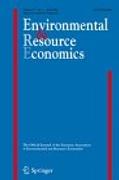Intra-Country Health Inequalities and Air Pollution in Developing Countries
1 décembre 2013

He J., Zhang B. (2021) Current air pollution and willingness to pay for better air quality: Revisiting the temporal reliability of the contingent valuation method, Environmental and Resource Economics, vol. 79(1) pp. 135-168.